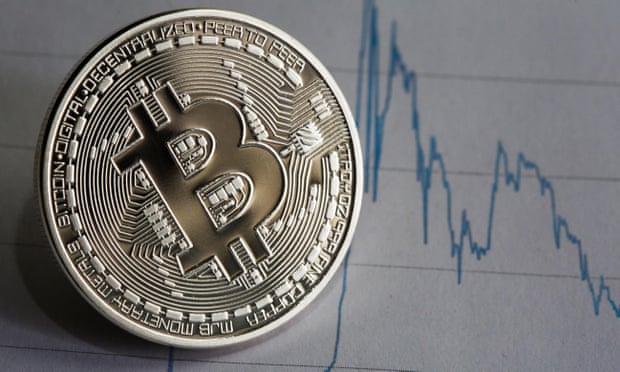Bitcoin is a fraud that will ultimately blow up, according to JP Morgan boss Jamie Dimon, who said the digital currency was only fit for use by drug dealers, murderers and people living in places such as North Korea.
Speaking at a conference in New York, the boss of America’s biggest bank said he would fire “in a second” anyone at the investment bank found to be trading in bitcoin. “For two reasons: it’s against our rules, and they’re stupid. And both are dangerous.”
Q&AWhat is bitcoin?
Show

Bitcoin is a 'cryptocurrency' – a decentralised tradeable digital asset. Invented in 2008, you store your bitcoins in a digital wallet, and transactions are stored in a public ledger known as the bitcoin blockchain, which prevents the digital currency being double-spent.
Cryptocurrencies can be used to send transactions between two parties via the use of private and public keys. These transfers can be done with minimal processing cost, allowing users to avoid the fees charged by traditional financial institutions - as well as the oversight and regulation that entails. The lack of any central authority oversight is one of the attractions.
This means it has attracted a range of backers, from libertarian monetarists who enjoy the idea of a currency with no inflation and no central bank, to drug dealers who like the fact that it is hard (but not impossible) to trace a bitcoin transaction back to a physical person.
The exchange rate has been volatile, with some deeming it a risky investment. In January 2021 the UK's Financial Conduct Authority warned consumers they should be prepared to lose all their money if they invest in schemes promising high returns from digital currencies such as bitcoin.
In practice it has been far more important for the dark economy than it has for most legitimate uses. In November 2021 it hit a record high of more than $68,000, as a growing number of investors backed it as an alternative to other assets during the Covid crisis.
Bitcoin has been criticised for the vast energy reserves and associated carbon footprint of the system. New bitcoins are created by “mining” coins, which is done by using computers to carry out complex calculations. The more bitcoins that have been "mined", the longer it takes to mine new coin, and the more electricity is used in the process.
He added: “The currency isn’t going to work. You can’t have a business where people can invent a currency out of thin air and think that people who are buying it are really smart.
“If you were in Venezuela or Ecuador or North Korea or a bunch of parts like that, or if you were a drug dealer, a murderer, stuff like that, you are better off doing it in bitcoin than US dollars,” he said. “So there may be a market for that, but it would be a limited market.”
Bitcoin is a virtual currency that emerged in the aftermath of the financial crisis. It allows people to bypass banks and traditional payment processes to pay for goods and services. Banks and other financial institutions have been concerned about bitcoin’s early associations with money laundering and online crime, and it has not been adopted by any government.
It has more than quadrupled in value since December, hitting about $4,700 last month before falling back. It fell by about 5% after Dimon’s comments on Wednesday to below $4,000.
“It is worse than tulip bulbs,” Dimon said, referring to a famous market bubble from the 1600s. He predicted big losses for those investing in bitcoin. “Don’t ask me to short it. It could be at $20,000 before this happens, but it will eventually blow up,” he said. “Honestly, I am just shocked that anyone can’t see it for what it is.”
However, the banker revealed his daughter had bought bitcoin: “It went up and she thinks she’s a genius now.”
Last week, Lady Mone launched a major property development in Dubai, priced in bitcoins, saying the digital currency was a growing market that could not be ignored.
The co-founder of the underwear brand Ultimo is selling the luxury apartments with her businessman boyfriend, Douglas Barrowman, and the £250m scheme will include two apartment blocks and a shopping centre. One-bedroom apartments will be priced at about 54 bitcoins, Barrowman said, while two-bedroom flats are expected to go for about 80 bitcoins.
Meanwhile, a London property developer is allowing its tenants to pay their deposits in bitcoin – the first time the cryptocurrency has been used in the UK residential homes market.
By the end of this year the Collective will also accept rent payments in the virtual currency. It said the move was in response to demand predominantly from international customers.
Dimon’s criticism of the currency coincided with a warning from the UK financial regulator against a speculative frenzy in initial coin offerings (ICOs), where internet start-ups are funded by investors using cryptocurrencies such as bitcoin.
In an ICO, an investor pays in bitcoins in return for a “coin” or “token” that is in effect their share in the firm.
The FCA said anyone investing in ICOs should be prepared to lose all their money. “ICOs are very high-risk, speculative investments,” it said. “You should be conscious of the risks involved … and prepared to lose your entire stake.”
Yann Quelenn, an analyst at the online bank Swissquote, said bitcoin “still has great potential”.
“We think it is a possible safe haven. Fewer than 0.01% of the world’s population has a bitcoin wallet,” he said. “If this would reach 1%, the demand for bitcoin would skyrocket, because there are only 18m coins available.
“Cryptocurrencies are a new asset class, one at war with fiat [paper] money, and that war will be fought on regulatory issues. Central banks are keen to preserve their monopoly on money, something they will not let go of without a fight.”

Comments (…)
Sign in or create your Guardian account to join the discussion